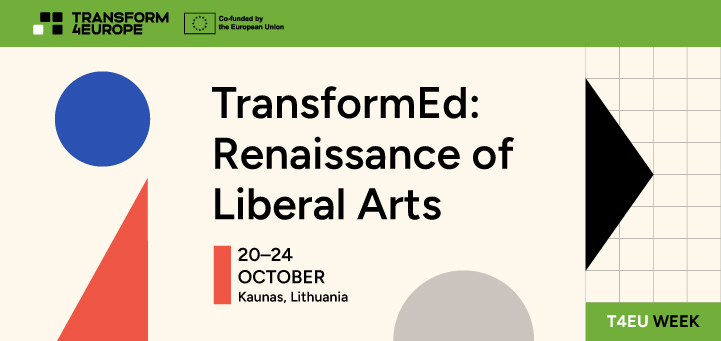Join “TransformEd: Renaissance of Liberal Arts” – A T4EU Week at Vytautas Magnus University

Vytautas Magnus University (VMU) invites students to register for “TransformEd: Renaissance of Liberal Arts” – a T4EU Week in Kaunas, Lithuania, from October 20-24, 2025.
Imagine a university not just as a place to find answers, but as a space where we ask deeper questions. A place that shapes us not only through the knowledge we gain but also through the people we become. VMU fosters the idea of Liberal Arts – a comprehensive, interdisciplinary, and values-based educational model – inviting you on just such a journey.
In a world that encourages specialization and rushing, Liberal Arts offers a chance to pause. It challenges us to look inward and to the past, not to romanticize it, but to discover the tools needed for wise living and righteous action. Today, in an era of rapid technological change, uncertainty, and cultural fragmentation, the idea of a “renaissance” – a rebirth – becomes especially relevant. We return to the foundations of Liberal Arts: critical thinking, civic responsibility, philosophical reflection, artistic expression, and the ability to connect disciplines, contexts, and communities.
What to Expect at the “TransformEd” Week
Over five days, participants will explore subjects at the intersection of knowledge and perspective, tradition and innovation. There will be no final exams; the true outcome of this week will be measured in the depth of the questions you carry home. This week encourages deep reading, critical thinking, and intelligent disagreement.
Course Offerings
Students are invited to choose and participate in one of the nine intensive courses offered, all conducted in English:
- “Making Sense of Disagreement: How to Communicate Effectively with Epistemic and Moral Awareness”: This course defines conceptual approaches and practical interventions for communicating on complex issues and handling disagreements. It draws on theories from communication science, political science, psychology, sociology, and education, encouraging students to align their knowledge with their values through discussions of digitally mediated conflicts and dysfunctional communication.
- “The Idea of Europe”: Explore how the concept of Europe has evolved through philosophy, literature, politics, and cultural identity from antiquity to the present. This course examines foundational texts and thinkers, tracing how Europe has been imagined as both a geographical space and a shared civilizational project.
- “Critical Heritage”: An introduction to critical heritage studies, with a particular emphasis on addressing the complex and contested legacies of modernity. Through lectures, workshops, and site visits, students will engage with key concepts and best practices in the field.
- “Globalization and International Communication”: This course is designed to address the recent rise of transnational communication cultures in their global and local contexts, highlighting the significance of local political, economic, and cultural conditions.
- “Field Notes to Frontlines: Anthropology That Matters”: This intensive course explores the field of applied and engaged anthropology, focusing on practical methodologies, ethical considerations, and representation issues when working with diverse cultural and social groups.
- “Creating a Musical from Scratch: International Musical Theater Workshop”: This intensive workshop guides international students through the collaborative process of creating and performing an original musical production. Participants will explore all aspects of musical theater creation, culminating in a public performance of their original work.
- “GIS 360°: Maps That Transform Society”: Through an interdisciplinary lens, students will learn to harness spatial technologies to address issues like climate justice, urban inequality, public health disparities, and environmental conservation.
- “Biodiversity Conservation: Understanding, Threats & Solutions”: The aim of this course is to provide knowledge about biodiversity and its protection, focusing on basic concepts, spatial distribution, value, causes of extinction, protection methods, and the importance of monitoring and species restoration.
- “Climate Change Science and Solutions”: This course provides the fundamentals of climate change science, policy frameworks, consequences, and sector- and region-specific strategies for mitigation and adaptation.
Important Information
- You can rank your top 3 preferred courses when applying.
- Each course will include both online components (prior to the T4EU Week) and in-person sessions in Kaunas.
- Successful completion of a course and a knowledge test will grant 3-4 ECTS credits.
- Lectures will mainly take place in the mornings, with afternoons offering various optional activities, including sports, cultural, and scientific events.
- The minimum number of participants per course is 10. If this number is not met, the course may not run.
- To ensure balance, a maximum of 3 PhD students from one university can be accepted into the same course. In addition to their chosen course, PhD students will have dedicated events to present their research and network, such as a Science Slam, mixers, and other activities.
- All courses will be conducted in English.
Registration is open until July 15th.
More information about the courses
Should you have any questions, please contact us at Transform4Europe@vdu.lt.












